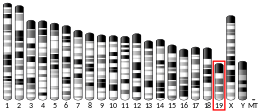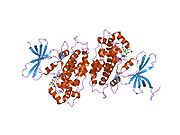From Wikipedia, the free encyclopedia
Proto-oncogene FRAT1 is a protein that in humans is encoded by the FRAT1 gene .[ 5] [ 6]
The protein encoded by this gene belongs to the GSK-3 -binding protein family. It may function in tumor progression and in lymphomagenesis .[ 6]
References
^ a b c GRCh38: Ensembl release 89: ENSG00000165879 – Ensembl , May 2017^ a b c GRCm38: Ensembl release 89: ENSMUSG00000067199 – Ensembl , May 2017^ "Human PubMed Reference:" . National Center for Biotechnology Information, U.S. National Library of Medicine .^ "Mouse PubMed Reference:" . National Center for Biotechnology Information, U.S. National Library of Medicine .^ Jonkers J, Korswagen HC, Acton D, Breuer M, Berns A (Mar 1997). "Activation of a novel proto-oncogene, Frat1, contributes to progression of mouse T-cell lymphomas" . EMBO J . 16 (3): 441–50. doi :10.1093/emboj/16.3.441 . PMC 1169648 PMID 9034327 . ^ a b "Entrez Gene: FRAT1 frequently rearranged in advanced T-cell lymphomas" .
Further reading
Li L, Yuan H, Weaver CD, et al. (1999). "Axin and Frat1 interact with dvl and GSK, bridging Dvl to GSK in Wnt-mediated regulation of LEF-1" . EMBO J . 18 (15): 4233–40. doi :10.1093/emboj/18.15.4233 . PMC 1171499 PMID 10428961 . Saitoh T, Katoh M (2001). "FRAT1 and FRAT2, clustered in human chromosome 10q24.1 region, are up-regulated in gastric cancer". Int. J. Oncol . 19 (2): 311–5. doi :10.3892/ijo.19.2.311 . PMID 11445844 . Bax B, Carter PS, Lewis C, et al. (2002). "The structure of phosphorylated GSK-3beta complexed with a peptide, FRATtide, that inhibits beta-catenin phosphorylation". Structure . 9 (12): 1143–52. doi :10.1016/S0969-2126(01)00679-7 . PMID 11738041 . Saitoh T, Mine T, Katoh M (2002). "Molecular cloning and expression of proto-oncogene FRAT1 in human cancer". Int. J. Oncol . 20 (4): 785–9. doi :10.3892/ijo.20.4.785 . PMID 11894125 . Freemantle SJ, Portland HB, Ewings K, et al. (2002). "Characterization and tissue-specific expression of human GSK-3-binding proteins FRAT1 and FRAT2". Gene . 291 (1–2): 17–27. doi :10.1016/S0378-1119(02)00594-2 . PMID 12095675 . Strausberg RL, Feingold EA, Grouse LH, et al. (2003). "Generation and initial analysis of more than 15,000 full-length human and mouse cDNA sequences" . Proc. Natl. Acad. Sci. U.S.A . 99 (26): 16899–903. doi :10.1073/pnas.242603899 . PMC 139241 PMID 12477932 . Hino S, Michiue T, Asashima M, Kikuchi A (2003). "Casein kinase I epsilon enhances the binding of Dvl-1 to Frat-1 and is essential for Wnt-3a-induced accumulation of beta-catenin" . J. Biol. Chem . 278 (16): 14066–73. doi :10.1074/jbc.M213265200 PMID 12556519 . Khambata-Ford S, Liu Y, Gleason C, et al. (2003). "Identification of promoter regions in the human genome by using a retroviral plasmid library-based functional reporter gene assay" . Genome Res . 13 (7): 1765–74. doi :10.1101/gr.529803 . PMC 403750 PMID 12805274 . Deloukas P, Earthrowl ME, Grafham DV, et al. (2004). "The DNA sequence and comparative analysis of human chromosome 10" . Nature . 429 (6990): 375–81. doi :10.1038/nature02462 PMID 15164054 . Gerhard DS, Wagner L, Feingold EA, et al. (2004). "The status, quality, and expansion of the NIH full-length cDNA project: the Mammalian Gene Collection (MGC)" . Genome Res . 14 (10B): 2121–7. doi :10.1101/gr.2596504 . PMC 528928 PMID 15489334 . Wang Y, Hewitt SM, Liu S, et al. (2006). "Tissue microarray analysis of human FRAT1 expression and its correlation with the subcellular localisation of beta-catenin in ovarian tumours" . Br. J. Cancer . 94 (5): 686–91. doi :10.1038/sj.bjc.6602988 . PMC 2361213 PMID 16479254 . Hagen T, Cross DA, Culbert AA, et al. (2007). "FRAT1, a substrate-specific regulator of glycogen synthase kinase-3 activity, is a cellular substrate of protein kinase A." J. Biol. Chem . 281 (46): 35021–9. doi :10.1074/jbc.M607003200 PMID 16982607 .
External links







